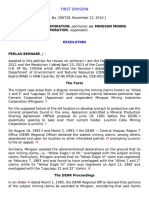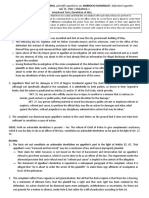Sunga V de Guzman
Sunga V de Guzman
Uploaded by
Loisse VitugCopyright:
Available Formats
Sunga V de Guzman
Sunga V de Guzman
Uploaded by
Loisse VitugOriginal Description:
Original Title
Copyright
Available Formats
Share this document
Did you find this document useful?
Is this content inappropriate?
Copyright:
Available Formats
Sunga V de Guzman
Sunga V de Guzman
Uploaded by
Loisse VitugCopyright:
Available Formats
Vitug, Loisse Danielle D.
Sunga v. De Guzman (1979)
Appellees were not aware that appellant's possession extended over the whole fishpond,
including that which pertained to them as their share, thus said possession cannot be
said to be adverse and open as to give rise to title by prescription.
FACTS:
A private contract of sale was signed by five (5) of the nine (9) legitimate heirs of the
spouses Juan de Guzman and Lucia Montemayor for a consideration of P700.00. The
property in question was a fishpond located in Pampanga.
However, the referred deed of sale is not notarized nor registered in the Register of
Deeds of Pampanga, hence the said property was still registered in the name of the
father of the heirs up to October 5, 1962. Three out of the four who did not sign
questioned the sale. Respondents claim they have acquired thru prescription.
ISSUE:
Whether or not petitioners have acquired ownership thru acquisitive and extinctive
prescription
RULING:
NO.
Petitioners’ claim of prescription is made to rest on their alleged adverse possession of
the whole fishpond, dating back from 1948. Respondents were not definitely aware that
appellant's possession extended over the whole fishpond, including that which
pertained to them as their share.
In that state of their knowledge as to the extent and nature of petitioners-appellant's
possession, said possession cannot be said to be adverse and open as to give rise to title
by prescription in favor of petitioners-appellants.
A fishpond is not as physically or actually occupied or held in possession as a parcel of
land, in that the signs of possession in the latter are more visible, and the extent of its
exercise or enjoyment, more manifest and easily determined.
The tax declaration over the land has remained up to the present in the name of the
original owners, the deceased parents of respondents-appellees. The possession of
petitioners-appellants, was, therefore, not completely adverse or open, nor was it truly
in the concept of an owner, which are indispensable elements for prescription to
become legally effective as a means of acquiring real property
You might also like
- Counter Affidavit 00342 Mocha AxlDocument6 pagesCounter Affidavit 00342 Mocha AxlClemente PanganduyonNo ratings yet
- 63 - La Toneda Vs Alto SuretyDocument2 pages63 - La Toneda Vs Alto SuretyAgripa, Kenneth Mar R.No ratings yet
- CIV2Document2 pagesCIV2Rina LibaNo ratings yet
- RUSSELL Vs VESTILDocument6 pagesRUSSELL Vs VESTILSlimNo ratings yet
- JURIS - Zapanta V Co King KiDocument8 pagesJURIS - Zapanta V Co King KiSj EclipseNo ratings yet
- United General Industries vs. PalerDocument1 pageUnited General Industries vs. PalerZandra LeighNo ratings yet
- 1993 Commercial Law Bar QuestionsDocument13 pages1993 Commercial Law Bar QuestionsJT GalNo ratings yet
- Obana V CADocument2 pagesObana V CAIvan Montealegre ConchasNo ratings yet
- Montilla vs. ArellanoDocument4 pagesMontilla vs. ArellanoLou StellarNo ratings yet
- Apo Cement Corp. v. Mingson Mining Industries Corp., G.R. No. 206728 (Resolution), (November 12, 2014) )Document6 pagesApo Cement Corp. v. Mingson Mining Industries Corp., G.R. No. 206728 (Resolution), (November 12, 2014) )PreciousGanNo ratings yet
- 9 Bicol Savings v. GuinhawaDocument2 pages9 Bicol Savings v. GuinhawaStephanie SerapioNo ratings yet
- David Vs AquilizanDocument1 pageDavid Vs AquilizanKatrina BudlongNo ratings yet
- G.R. No. 153134Document2 pagesG.R. No. 153134Dan LocsinNo ratings yet
- Office of The Solicitor GeneralDocument1 pageOffice of The Solicitor GeneralBrigette DomingoNo ratings yet
- Legres Paper 2 NotesDocument5 pagesLegres Paper 2 NotesCristine Joy KwongNo ratings yet
- Defenses of The Common Carrier (A) FULL TEXTSDocument48 pagesDefenses of The Common Carrier (A) FULL TEXTScharityNo ratings yet
- 001 (Makati Stock Exchange V Campos GR No 138814)Document11 pages001 (Makati Stock Exchange V Campos GR No 138814)Kps12No ratings yet
- Criminal Procedure BautistaDocument3 pagesCriminal Procedure BautistaMhayBinuyaJuanzonNo ratings yet
- Sample Petition For Bar ExamDocument3 pagesSample Petition For Bar ExamCatNo ratings yet
- Madrona Vs RosalDocument4 pagesMadrona Vs RosalSamantha BaricauaNo ratings yet
- Legal MemoDocument8 pagesLegal MemoRossette AnaNo ratings yet
- Metrobank v. SF Naguiat MDocument2 pagesMetrobank v. SF Naguiat MGab SollanoNo ratings yet
- People Vs Capuno DigestDocument2 pagesPeople Vs Capuno DigestErold John Salvador BuenaflorNo ratings yet
- Judicial Confirmation of Imperfect or Incomplete TitlesDocument2 pagesJudicial Confirmation of Imperfect or Incomplete TitlesBer Sib JosNo ratings yet
- POBLETE CONSTRUCTION Vs ASIAIN PDFDocument2 pagesPOBLETE CONSTRUCTION Vs ASIAIN PDFNeri Danessa LabayogNo ratings yet
- Departmental Final Exam Labor StandardsDocument4 pagesDepartmental Final Exam Labor StandardsJNo ratings yet
- Statement of FactsDocument2 pagesStatement of FactsRome Dela RosaNo ratings yet
- CORNELIO AMARO, and JOSE AMARO, Plaintiffs-Appellants, vs. AMBROCIO SUMANGUIT, Defendant-AppelleeDocument2 pagesCORNELIO AMARO, and JOSE AMARO, Plaintiffs-Appellants, vs. AMBROCIO SUMANGUIT, Defendant-AppelleeMaria Angela GasparNo ratings yet
- AM No 02-11-10-SC Rule On Declaration of Absolute Nullity of Void Marriages and Annulment of Voidable MarriageDocument6 pagesAM No 02-11-10-SC Rule On Declaration of Absolute Nullity of Void Marriages and Annulment of Voidable MarriageLyndell NabuaNo ratings yet
- Collated Sales (Mine)Document7 pagesCollated Sales (Mine)Clase Na PudNo ratings yet
- Fontanilla v. MaliamanDocument2 pagesFontanilla v. MaliamanKenneth Jamaica FloraNo ratings yet
- Adaza vs. SadiganbayanDocument2 pagesAdaza vs. SadiganbayanArla AgrupisNo ratings yet
- Distinction Art 1191 and 1381Document11 pagesDistinction Art 1191 and 1381DawiNo ratings yet
- People Vs LosanoDocument3 pagesPeople Vs Losanojovelyn davoNo ratings yet
- Medina Vs Beda Gonzales, G.R. No. L-34760 September 28, 1973Document2 pagesMedina Vs Beda Gonzales, G.R. No. L-34760 September 28, 1973Jay CruzNo ratings yet
- Pre Trial Brief2Document4 pagesPre Trial Brief2NaigAnipseNo ratings yet
- G.R. No. 44658, January 24, 1936 Digest By: MARGALLO: 2. Divino V. HilarioDocument1 pageG.R. No. 44658, January 24, 1936 Digest By: MARGALLO: 2. Divino V. HilarioVener Angelo MargalloNo ratings yet
- Sabitsana Vs MuerteguiDocument4 pagesSabitsana Vs Muerteguij guevarraNo ratings yet
- Saludaga V FEUDocument20 pagesSaludaga V FEUMicah Celine CarpioNo ratings yet
- OCA Circular No 07-2002Document5 pagesOCA Circular No 07-2002Larsen ValeroNo ratings yet
- Arsenio Tabasondra, Et Al. v. Spouses Conrado Constantino, Et - Al. (Property)Document3 pagesArsenio Tabasondra, Et Al. v. Spouses Conrado Constantino, Et - Al. (Property)Jessamyn DimalibotNo ratings yet
- Dycaico v. SSSDocument4 pagesDycaico v. SSSMelissa Mae Cailon MareroNo ratings yet
- PT Cerna and Saguid Case DigestsDocument3 pagesPT Cerna and Saguid Case DigestsAices SalvadorNo ratings yet
- People Vs PadrigoneDocument6 pagesPeople Vs PadrigoneGlutton ArchNo ratings yet
- Willex Vs CADocument3 pagesWillex Vs CALee Sung YoungNo ratings yet
- Enrile Vs Judge AminDocument2 pagesEnrile Vs Judge AminVir Stella MarianitoNo ratings yet
- Beltran V People GR 175013 June 1 2007Document99 pagesBeltran V People GR 175013 June 1 2007JP DCNo ratings yet
- Plaridel-Surety-GR-183128-Mar-20-2017 Full TextDocument8 pagesPlaridel-Surety-GR-183128-Mar-20-2017 Full TextC SNo ratings yet
- Burca vs. RepDocument10 pagesBurca vs. RepJenny ButacanNo ratings yet
- Crim1 Midterm ReviewerDocument4 pagesCrim1 Midterm ReviewerDrexel Arginald AltavanoNo ratings yet
- REPUBLIC OF THE PHILIPPINES Vs EvangelistaDocument2 pagesREPUBLIC OF THE PHILIPPINES Vs Evangelistafermo ii ramosNo ratings yet
- Government of Hong Kong Special Administrative Region Vs Judge Olalia and Juan Antonio MunozDocument2 pagesGovernment of Hong Kong Special Administrative Region Vs Judge Olalia and Juan Antonio MunozCecille Garces-SongcuanNo ratings yet
- Proceedings Before The Municipal Trial Court in Cities (MTCC)Document3 pagesProceedings Before The Municipal Trial Court in Cities (MTCC)Paul Joshua Torda SubaNo ratings yet
- Ebralinag v. Divison Superintendent of Schools of Cebu - G.R. No. 95770Document1 pageEbralinag v. Divison Superintendent of Schools of Cebu - G.R. No. 95770Krisha Marie Tan BuelaNo ratings yet
- Nov 2017 - PDFDocument4 pagesNov 2017 - PDFSam MaulanaNo ratings yet
- Olegario Vs MariDocument2 pagesOlegario Vs MariPaulino Belga III100% (1)
- Yu-Heirs of LauraDocument7 pagesYu-Heirs of LauraJaimie Paz AngNo ratings yet
- Romero v. NatividadDocument2 pagesRomero v. NatividadJerry CaneNo ratings yet
- Property Assignment8302017Document5 pagesProperty Assignment8302017Andrea DeloviarNo ratings yet
- LTD Up To Chap 2Document11 pagesLTD Up To Chap 2dianne rosalesNo ratings yet
- Imani Ko ReyesDocument3 pagesImani Ko ReyesLoisse VitugNo ratings yet
- Executive Sec V CADocument19 pagesExecutive Sec V CALoisse VitugNo ratings yet
- Halley V PrintwellDocument10 pagesHalley V PrintwellLoisse VitugNo ratings yet
- Sps. Firme V BukalDocument17 pagesSps. Firme V BukalLoisse VitugNo ratings yet
- Digests FinalsDocument37 pagesDigests FinalsLoisse VitugNo ratings yet
- Villa Rey V FerrerDocument48 pagesVilla Rey V FerrerLoisse Vitug0% (1)
- Nature: (Hide) 1 o 1.1 o 1.2 2 o 2.1 o 2.2 o 2.3Document2 pagesNature: (Hide) 1 o 1.1 o 1.2 2 o 2.1 o 2.2 o 2.3Loisse VitugNo ratings yet
- Crossfield and O'Brien For Plaintiff. Attorney-General Avanceña For Defendant.Document6 pagesCrossfield and O'Brien For Plaintiff. Attorney-General Avanceña For Defendant.Loisse VitugNo ratings yet
- D.5. (Us V Nixon)Document18 pagesD.5. (Us V Nixon)Loisse VitugNo ratings yet
- Sycip, Salazar, Luna & Manalo & Feliciano Law For Petitioners. Albert, Vergara, Benares, Perias & Dominguez Law Office For RespondentsDocument3 pagesSycip, Salazar, Luna & Manalo & Feliciano Law For Petitioners. Albert, Vergara, Benares, Perias & Dominguez Law Office For RespondentsLoisse VitugNo ratings yet
- Pangilinan V MaglayaDocument6 pagesPangilinan V MaglayaLoisse VitugNo ratings yet
- Laban V ComelecDocument2 pagesLaban V ComelecLoisse VitugNo ratings yet
- Tan V BarriosDocument10 pagesTan V BarriosLoisse VitugNo ratings yet
- 6 Laurel V GarciaDocument9 pages6 Laurel V GarciaLoisse VitugNo ratings yet
- Pre Trial BriefDocument13 pagesPre Trial BriefLoisse VitugNo ratings yet










































































